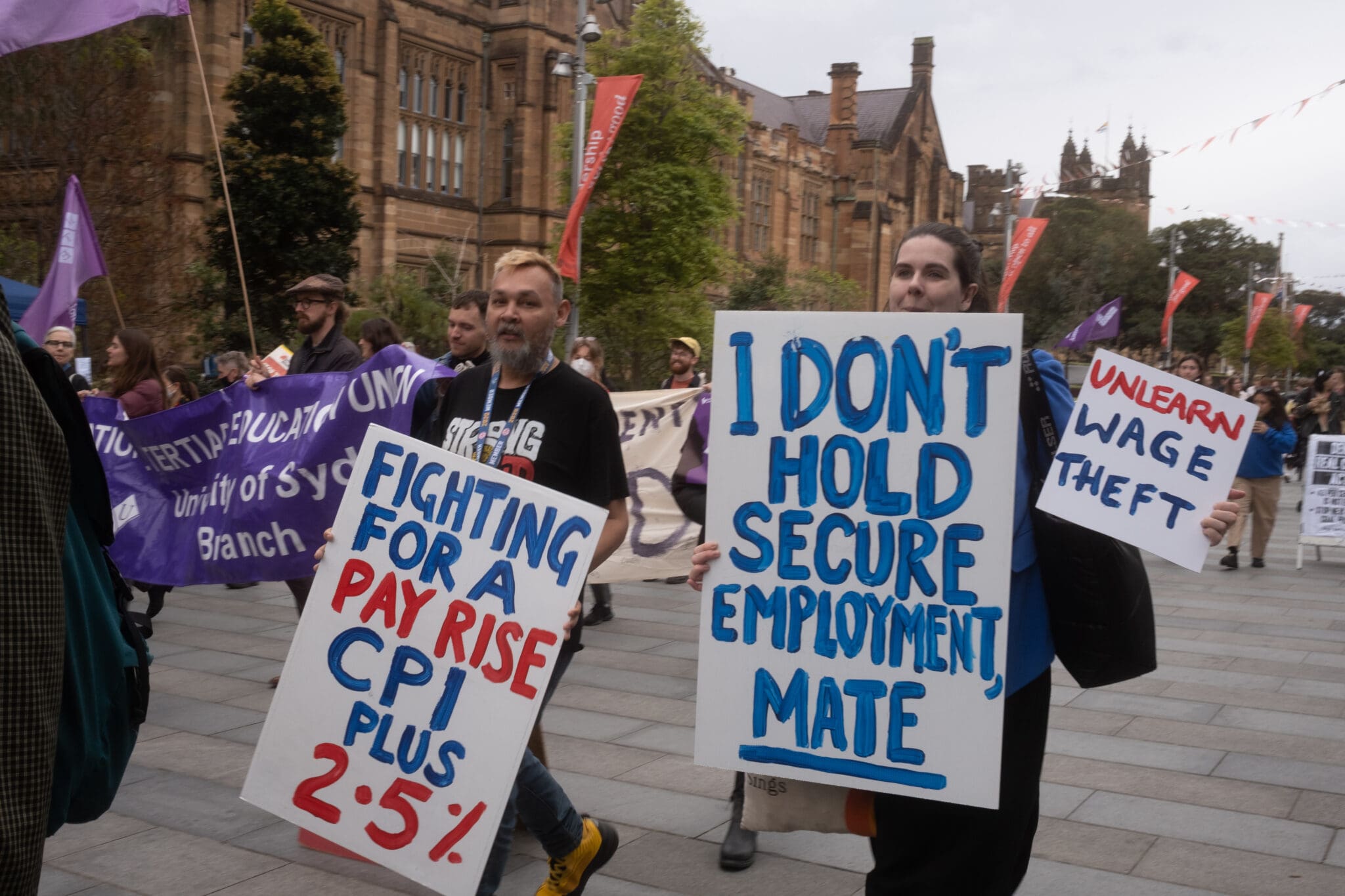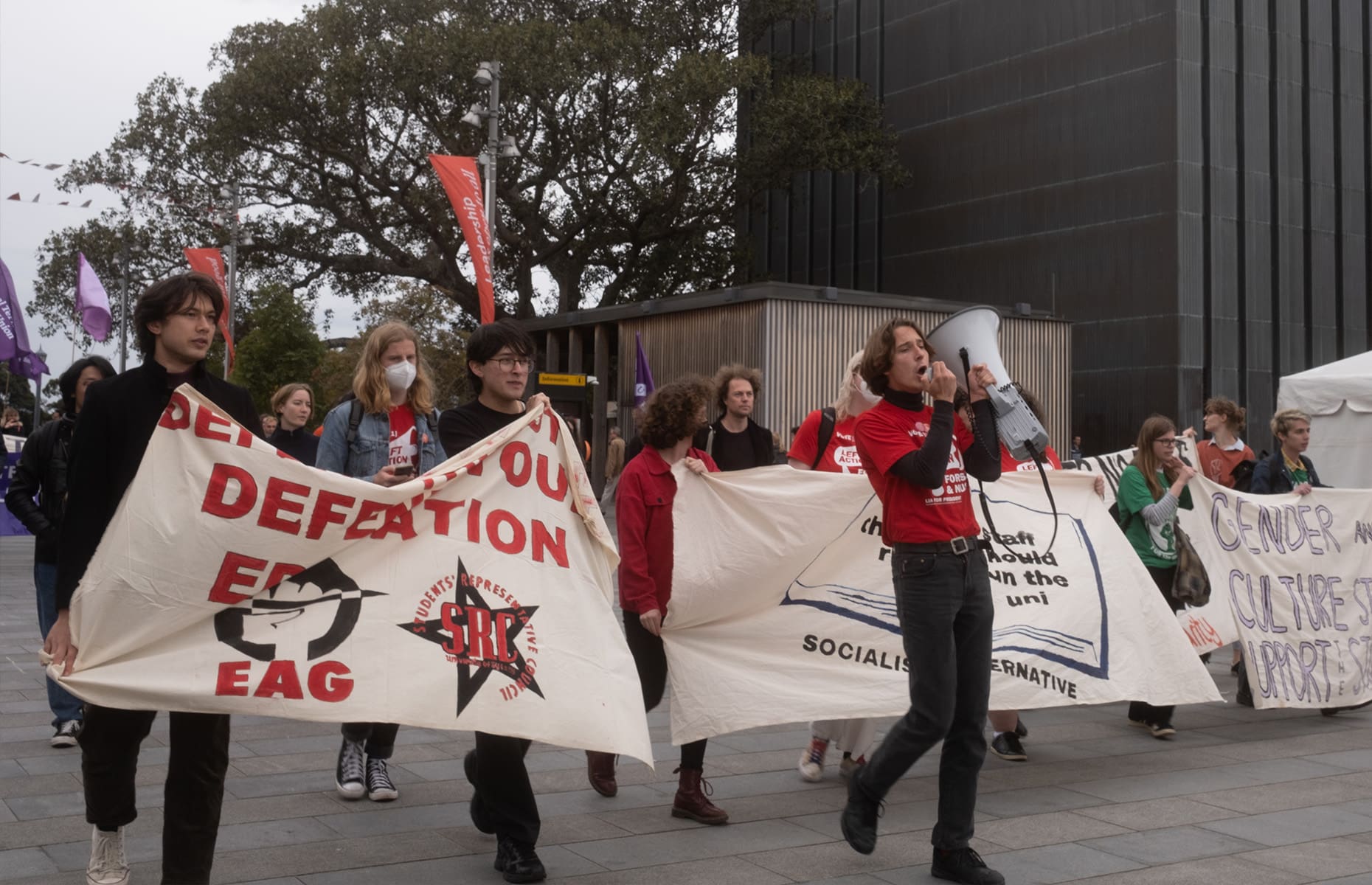Approximately 80 student activists and staff marched down City Road yesterday to demand an end to wage theft and the exploitation of casual staff at the University of Sydney.
This comes as staff prepare for their fifth and sixth days of strike action this year on 13 and 14 October, as part of their enterprise bargaining negotiations with university management, where de-casualisation is a key demand.
The rally began at Fisher Library and was chaired by SRC Education Officers Lia Perkins and Deaglan Godwin who pointed out, “In 2021, the Uni recorded a budget surplus of $1.05 billion, and in the same year were accused of wage theft amounting to over $60 million by staff in the Faculty of Arts and Social Sciences alone.”
Over 80 staff in the faculty have submitted underpayment claims that the University is refusing to repay despite its billion-dollar surplus and Vice-Chancellor Mark Scott’s salary of $1.1 million.
One of the key demands within the NTEU’s log of claims is an enforceable employment target of no less than 3 percent for Aborignal and Torres Strait Islander staff.
“This land, wherever you live… you are going home to Aboriginal land,” said Jeremy Heathcote, USyd’s Indigenous Community Engagement Officer and an NTEU activist.
Lucy Nicholls, a casual tutor in the Department of Philosophy and a Casuals Network activist, described her ongoing struggles for a contract renewal for a job she has “performed successfully for the last six years”, as well as her efforts to be remunerated fairly.
“The University owes me over $50,000 in stolen wages,” Nicholls said.
She describes university casualisation as “to be systematically exploited, systematically disrespected and systematically underpaid.” The Casuals Network is providing “detailed reports into wage theft of over 2 million dollars” and being met with refusal at every turn. Nicholls said that this “can only lead to a degraded environment where we cannot hope to support students”.
Harrison Brennan, an activist with the Education Action Group and an Ancient History and Philosophy Student, echoed this sentiment: “Staff working conditions are student learning conditions. It is therefore crucial that we stand together in this fight for a better university.”
In between speeches, Godwin led the chant “Free education, casual rights, one struggle, one fight.”

Protestors marched to the F23 Administration Building, dubbed “Mark Scott’s Palace” by education activist Ella Haid. Her speech began with a short game quizzing protesters about the parallels between current living standards and feudal times, something that is fast becoming a tradition among students.
“Is this the feudal era or one of the wealthiest countries in the world in 2022?” Haid questioned. “Fruit and vegetables are becoming near-luxury items, people are becoming ill from their mould-infested housing and our workplace’s wealthy overlord steals huge amounts from his workers to live in unfathomable luxury.”
Haid emphasised the national importance of the USyd strikes, arguing that setting a high bar of “no concessions” in enterprise agreement negotiations has shown staff across the sector how they might win better benefits at their own campuses.
“Management has every Vice-Chancellor in the country looking over their shoulders to learn how to beat back workers,” Haid said.
On the Week 10 strikes, Haid urged the crowd to “make it a ghost town and show management who runs this uni”.
USyd NTEU Branch President Nick Reimer closed the rally by noting the divide between the “corporate jargon” of management’s 2032 Strategy document and the log of claims filed by staff.
“As though it can be ‘excellence’ to have work done by exploited staff who can’t afford rent and food. That is not excellence. There is another e-word for this: exploitation,” said Riemer.
“I look forward to seeing you on the pickets on the 13th and 14th of October,” he said.
The end of the speeches saw students and staff foray onto City Road, halting all traffic to the chant of “When staff rights are under attack, what do we do? Stand up, fight back!”





